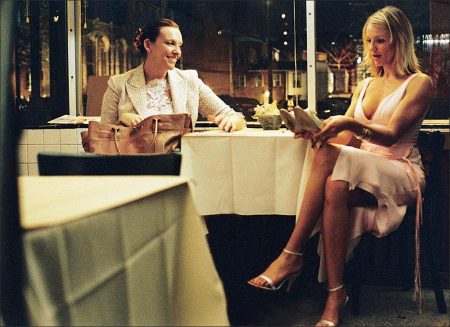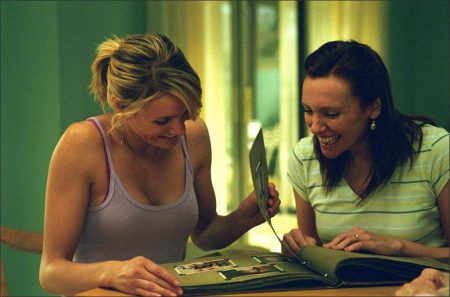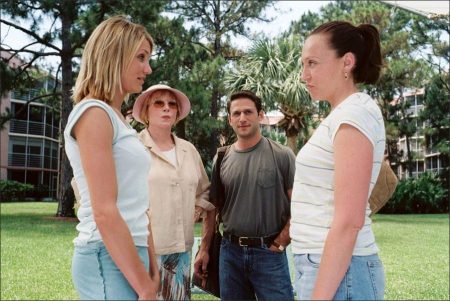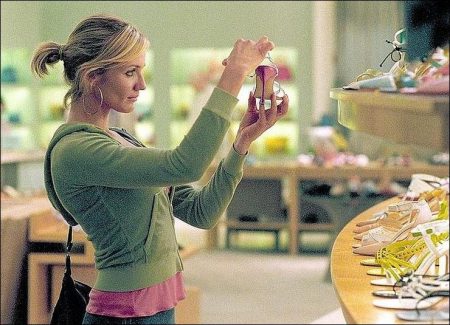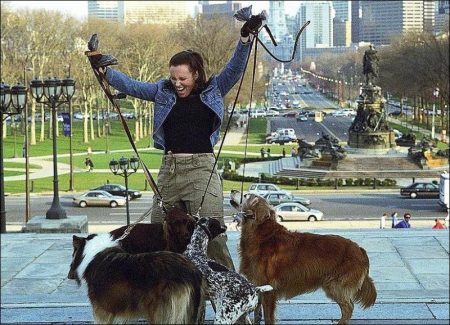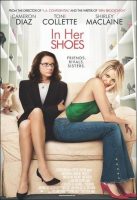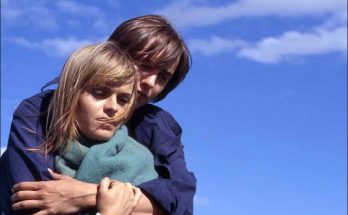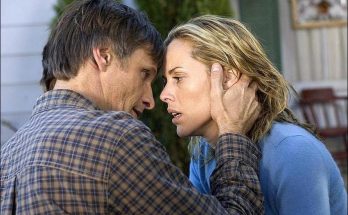In Her Shoes Movie Trailer. Director Curtis Hanson’s masterful work on films such as “L.A. Confidential,” “Wonder Boys” and “8 Mile,” could leave some to consider the female-centric world of In Her Shoes to be a departure for the filmmaker. But Hanson doesn’t see it that way. “In Her Shoes is not that different from my other films, because all of these movies are about characters who are struggling to figure out what they’re doing with themselves and what they’re doing with their lives, characters who are yearning for human connection and family.”
Jennifer Weiner’s second novel, In Her Shoes, was published in 2002, and quickly climbed onto bestseller lists. Recalls Weiner: “Some of the questions I had when I started writing the book were: How can people who come from literally the same place, who grow up in the same house, go on the same vacations and eat the same food for dinner, wind up being totally different people with different interests, different attitudes, and different looks? What do they still share? What are the bonds that exist no matter where their lives take them?
“In families with more than one sibling, there is often the feeling of being put into a box: you’re the smart, responsible one, while you’re the screwed up one we’re going to have to keep an eye on. I find it interesting how those labels serve you and how they hold you back.”
When she took on the adaptation of Weiner’s novel, screenwriter Susannah Grant (“Erin Brockovich”) was attracted to the rich yet painful relationship between the two sisters. “The truth is that the person who knows you best is the person who can hurt you the most,” she explains.
“That’s also the same person who can help you the most when you’re hurt. That’s the risk of loving; but the risk of not loving is greater because that’s horrible loneliness. In the beginning most of the characters in the story are in some sort of ‘well of loneliness’ – suffering from the same isolation.”
“When I read Susannah’s screenplay,” says Weiner, “I kicked myself because she had written things that I wish I had thought of. She totally captured the heart of the sisters.
“What’s so great about these two sisters,” says Curtis Hanson, “is that on the one hand they’re opposites. Maggie is beautiful, but thinks she’s dumb. Rose is an over-achiever and thinks she’s homely. But they’re actually two sides of the same coin. They’re connected through their mutual dependency, through habit, through love. And it’s not until trauma breaks them apart that they’re forced to function as individuals, which actually liberates them, allowing them to go their own way, in a sense discover their true selves.”
Hanson’s producing partner, Carol Fenelon, responded to the way the screenplay dealt with the issue of self-esteem. “So often we succumb to other people’s perceptions of what we should be,” says Fenelon. “In Her Shoes explores the challenge of making the most of what we’re capable of – about being comfortable in one’s own shoes. Maggie and Rose come to realize it’s never too late to change one’s path.”
As the movie begins, Maggie has burned every bridge with her family. She has hit bottom. “Maggie is like a child,” says Cameron Diaz. “She seems tough and outgoing, but she’s really very lonely, selfish and self-centered. To make her way through life, she can only use sexuality, looks and charisma. Eventually, she realizes these things are running dry, and that she must adopt a different way of living by relating to the people who love her. But she has always seen herself as a victim. She never takes responsibility for her actions, so she doesn’t really understand how she has arrived at such a bad place. When Rose throws her out, she truly has no friends to rely on, no place to go. She is desperate and terrified, and everything she does stems from that fear.”
“When we meet Maggie, she’s someone who always takes and never gives back,” says Carol Fenelon. “But during her journey, Maggie’s tremendous capacity for empathy begins to emerge. It is ultimately her ability to understand what it is like to stand in someone else’s shoes that fuels her growing desire to extend herself to others…her grandmother, the Professor, the older women in the retirement community, and Rose.”
“Cameron’s portrayal of Maggie is truly magical. She brings to the role a great understanding of how attractiveness can be an asset in our society,” says Hanson. “She also knows how appearances can be a mask. The wonderful thing about her performance is the way in which she illuminates Maggie’s fears, insecurity, and vulnerability. So even when Maggie’s doing horrible, unspeakable things, things you would never do to a sister, Cameron makes us believe there is a goodness inside of her. You can see that Maggie is yearning to be taken for more than just a pretty face or the girl with the great body. You feel for Maggie because you realize how badly she wants to make a life for herself, and you understand how her lack of selfconfidence makes that so hard.
“When I tell a story cinematically,” Hanson continues, “I try to encourage the audience to feel what the character feels, to actually enter their world. Since Maggie is an unanchored character with no emotional mooring, I shot all of her scenes in the early part of the movie with a handheld camera. I didn’t want the audience to consciously be aware of that, but I wanted them to feel a detached looseness about Maggie, because she never knows which way she’s going.
Similarly, I tried to work into many of Maggie’s scenes a mirror or window that casts a reflection, because Maggie’s world is all about the surface; it’s her good looks that have allowed her to get by. Rose, on the other hand, avoids mirrors altogether until she is feeling more selfassured. Near the end of the movie, when both sisters are seeing themselves and each other more clearly, it felt right to stage that critical bathroom scene between the two of them in front of a large mirror.”
When she took on the role of Rose, Toni Collette also had to take on additional weight. “I vowed to high heavens that I would never put on weight again for a movie,” laughs the Australian actress, who gained forty-three pounds for her second film, “Muriel’s Wedding.”
“But Curtis has this way of getting what he wants and I ended up putting on twenty-five pounds to play the part. Then, once Rose quits her job and begins to fall in love and become a happier person it affects her physically. So I then had to lose the weight through a rigid diet and exercise program during the middle of shooting. I don’t think I’ll be doing this ‘weight see-saw’ thing again. But with IN HER SHOES, it was worth it because that part of Rose’s life really affects and inhibits her.”
Hanson had long been an admirer of Collette’s talent, especially her chameleon-like ability to completely transform herself into the characters she plays. “Toni takes what is discovered during rehearsal and then continues to burrow down into the most inner recesses of her character. When it’s time to shoot, the subtle nuances she brings to her portrayal are often breathtaking.”
Collette explains that Rose’s “shoe-aholism” is an important part of the character. “She can’t treat herself with clothes because that only reminds her that she is overweight and doesn’t like her body,” says Collette. “But feet don’t grow larger, so shoes will always fit her. She has shoes in her cupboard, some still in their boxes. They’re untouched, on display behind closed doors. And yet, they may be worn one day. They are like Rose, who is so beautiful but so covered up.”
Although Rose seems unaware of her charms at the beginning of the film, Simon Stein sees them quite clearly. Collette recalls Simon’s pursuit of Rose: “She finds it kind of shocking and also very frightening. Simon is a gentle and quiet man, the kind people tend not to focus on. He’s pursued Rose for a long time and once she opens the door a little, he pushes on. Initially she isn’t really interested, but the more she gets to know him, the more she realizes what a beautiful soul he is. Simon helps Rose recognize her own wonderful qualities that she has never acknowledged before, and she finds that Simon really is the love of her life.”
Mark Feuerstein plays the role of Simon, whose common sense and love for Rose finally bring her the happiness she has yearned for. “Simon really is very simple,” says Feuerstein. “He loves food, the ‘Sixers,’ the law, politics – and Rose. And when he finally gets her to respond to him, he’ll do anything in his power to keep her. He doesn’t understand Rose’s wish for somebody else’s life. He’s very pragmatic. Simon thinks that once you realize that this is your life and that your life is made up of choices, the sooner you accept that fact, the happier you’re going to be.
“When I first read the script, I felt I really connected to Simon because he has a woman in his life who is not fully opening up to him, and I’ve been in that situation before. He and Rose are trying to get to know one another and her reticence makes it very difficult. When they have a fight and he asks what’s wrong, she won’t tell him. Instead, she shuts down. I think everyone who has been in a relationship can relate to that problem of communication.”
Maggie and Rose are not the only women in the story who blossom. The catalyst of their transformation – their grandmother, Ella Hirsch – also undergoes significant changes. Ella had a daughter – Maggie and Rose’s mother – who suffered from bipolar disorder. She has always felt that she failed her daughter and fears that her daughter’s death is her fault. Ella never lets herself even think about it.
The role of Ella was partially inspired by Jennifer Weiner’s own grandmother, who lives in a residential community for active seniors in Florida. “I always thought it would be an interesting setting for a comic novel because of the mating rituals and the way that everything changes,” says Weiner. “When you’re sixteen, all you want to know is, does the guy have a car.
And when you’re eighty, all you want to know is, does the guy have a car… and can he still drive at night. It’s a place where people are negotiating their lives again, sort of a new start for everybody. It’s kind of a reinvention. And Ella is reinventing herself at the same time that Rose and Maggie are.”
In Her Shoes (2005)
Directed by: Curtis Hanson
Starring: Cameron Diaz, Toni Collette, Shirley MacLaine, Mark Feuerstein, Brooke Smith, Andy Powers, Marcia Jean Kurtz, Candice Azzara, Kateri DeMartino, Nicole Randall Johnson
Screenplay by: Susannah Grant
Production Design by: Dan Davis
Cinematography by: Terry Stacey
Film Editing by: Lisa Zeno Churgin, Craig Kitson
Costume Design by: Sophie De Rakoff
Set Decoration by: Michael McCole, Teresa Visinare
Art Direction by: John Warnke
Music by: Mark Isham
MPAA Rating: PG-13 for thematic material, language, sexual content.
Distributed by: 20th Century Fox
Release Date: October 7, 2005
Views: 201
